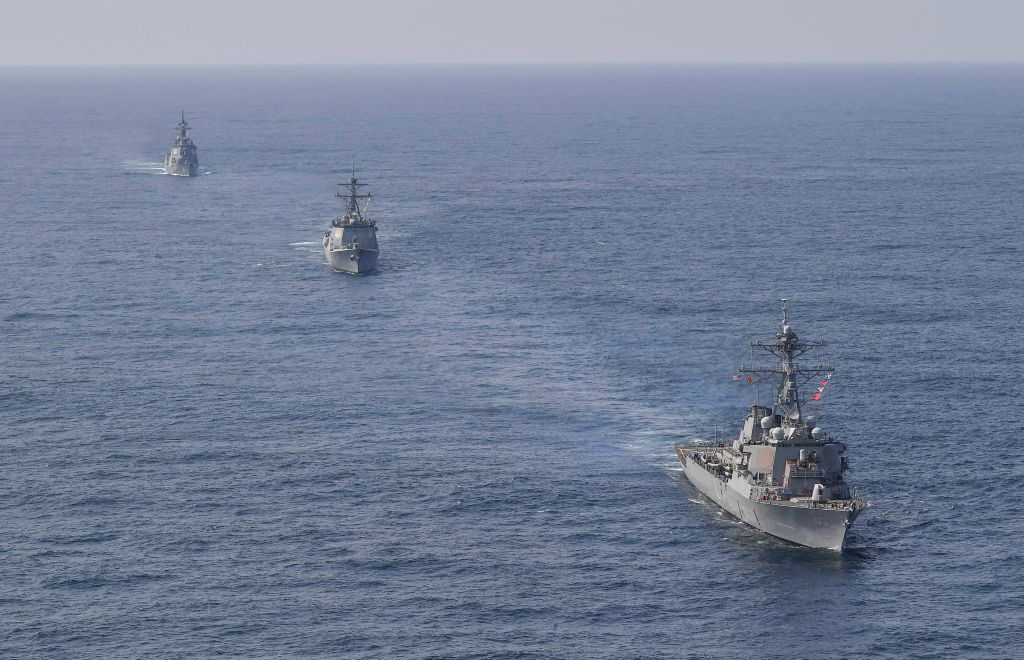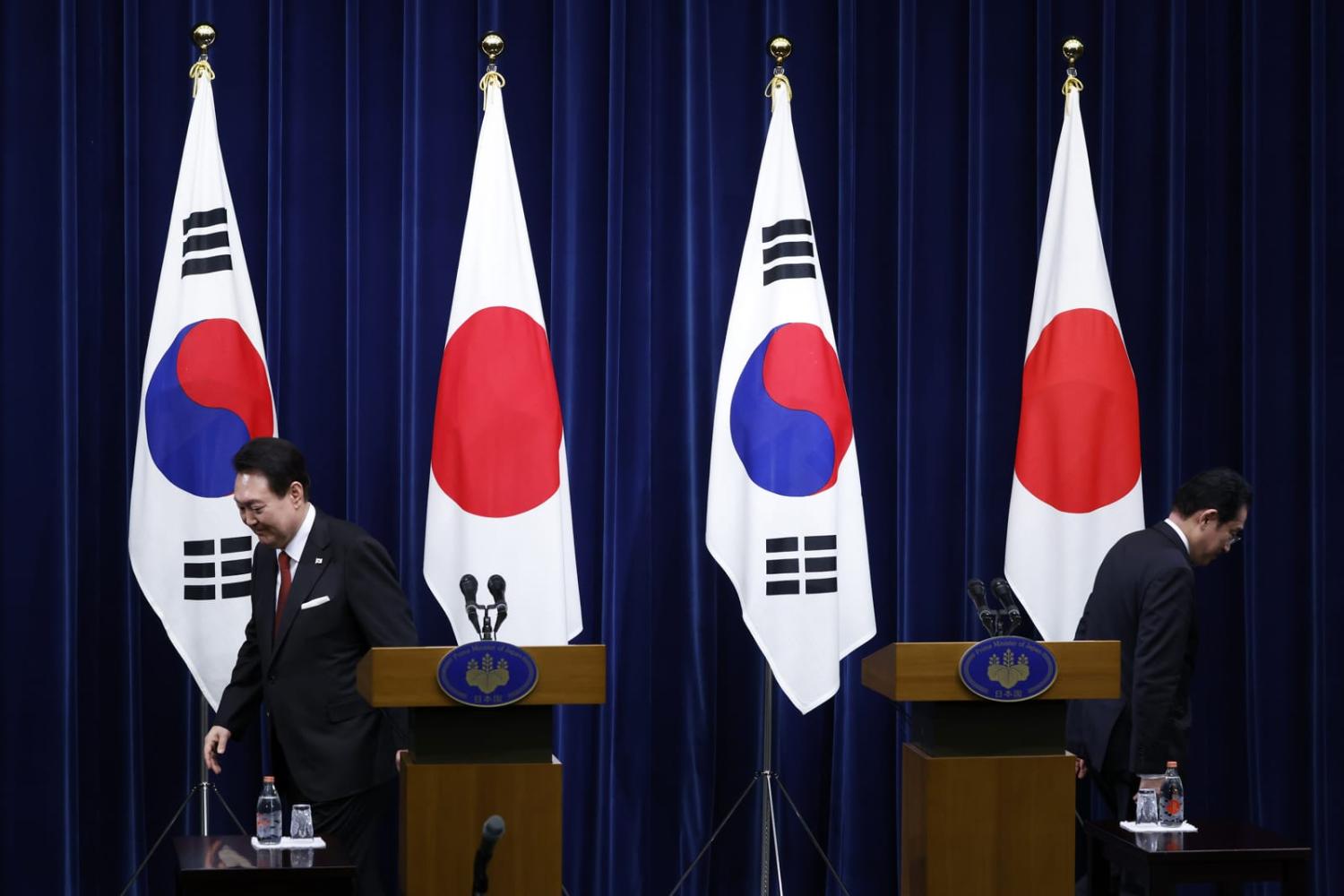The Philippines may be the oldest US treaty ally in Asia, but South Korea and Japan are arguably the closest. The US-South Korea mutual defence treaty will turn 70 years old this October, and both countries have spent the last several months implementing the April 2023 Washington Declaration that reiterates Washington’s extended deterrence commitment to Seoul in the face of North Korea’s growing nuclear and missile capability. Japan, meanwhile, is undergoing its own defence transformation of sorts, planning a doubling of its defence budget over the next five years and boosting the interoperability of their forces with countries from the Philippines to Australia.
The bilateral relationship between South Korea and Japan, however, has always been a one-step forward, two-steps back situation. Imperial Japan’s thirty five-year colonisation of the Korean Peninsula before and during the Second World War, and all of the human rights abuses that went along with it, was the albatross around the relationship’s neck. Japan and South Korea were more than happy to work with the United States, but the United States was considered lucky if it could drag Japan and South Korea into the same room.
South Korea-Japan relations still aren’t rosy, but they are far better off today than they were four or five years ago.
Exhibit A: this week’s trilateral summit hosted by US President Joe Biden at the Camp David presidential retreat. The administration has high hopes for the session; as US Secretary of State Antony Blinken told reporters on 15 August, the meeting is “historic” in-and-of-itself. “Strengthening our trilateral cooperation is critical to delivering for our people, for the region, and for the world.”
The deliverables are still up in the air, but there are rumours that the three countries will set up a hot-line for consultations during times of crisis, regularise trilateral military exercises, hold trilateral leaders’ summits on an annual basis, and ensure that their respective national security advisers are meeting at least twice a year. While this may not sound revolutionary, one would be hard pressed to envision a similar set of agreements even a year ago.
The Biden administration clearly views the trilateral summit this Friday as an opportunity to institutionalise its whole foreign policy belief-system, centred on broadening alliances in order to address shared challenges.
The Camp David meet-up is the culmination of significant work on Washington’s part to nudge its two allies closer together. The effort has paid dividends. During a trilateral on the sidelines of the November 2022 G20 summit, South Korea’s President Yoon Suk-yeol and Japanese Prime Minister Fumio Kishida agreed to share more real-time information on North Korean missile launches. In March, South Korea re-entered a military intelligence-sharing pact with Japan, which the previous South Korean administration under Moon Jae-in withdrew from in 2019, purportedly in retaliation for Tokyo dropping Seoul from its list of preferred trade partners. In April this year, Japan reversed that earlier decision and put South Korea back on the list after Seoul did the same. Yoon visited Japan in March for an in-person bilateral meeting and Kishida returned the favour in May, becoming the first Japanese prime minister in 12 years to set foot on South Korean soil.

All of this is positive from the US standpoint. But what’s good for Washington isn’t necessarily good for Beijing and Pyongyang. China will be closely watching the trilateral for any mention of Taiwan in the forthcoming joint statement. Taiwan will, of course, feature – the question is to what extent Washington, Seoul and Tokyo will dwell on the Taiwan issue. China will be livid regardless. For good or ill, Beijing is convinced the Washington is pulling out all the stops for this escapade in the Maryland mountains because it sees deeper US-South Korea-Japan military ties as indispensable to containing Chinese power.
North Korea won’t be any less tense. While it’s easy to dismiss North Korean leader Kim Jong-un’s rhetoric as lunatic rantings, Kim’s worries about deeper trilateral cooperation are perfectly understandable from where he sits – atop a poor, largely isolated country whose conventional military capabilities outside of its missile program is sorely lacking. For Kim, the US-South Korea-Japan confab is confirmation that North Korea’s weapons programs need to be accelerated, lest Pyongyang be caught unprepared during a state of hostilities. US officials find this reasoning idiotic – Washington, after all, has no intention of invading North Korea. Yet Kim seems to believe it, nonetheless.
There are unintended repercussions associated with the upcoming trilateral meeting as well. China and North Korea aren’t sitting still. They see their adversaries bolstering their defences and institutionalising a military relationship with each other, and they have no intention of sitting back without countermeasures. Whether intended or not, greater US-South Korea-Japan collaboration will likely result in greater collaboration between China, North Korea and Russia. Chinese and Russian military forces have already enhanced joint exercises in the air and at sea. Last month, Russian and Chinese bombers flew together over the Sea of Japan, which prompted Tokyo to scramble fighter aircraft. Their respective navies exercised in the Sea of Japan as well.
The message to Washington and its allies is clear: if you want a confrontation between blocs, then that’s precisely what you will get.

